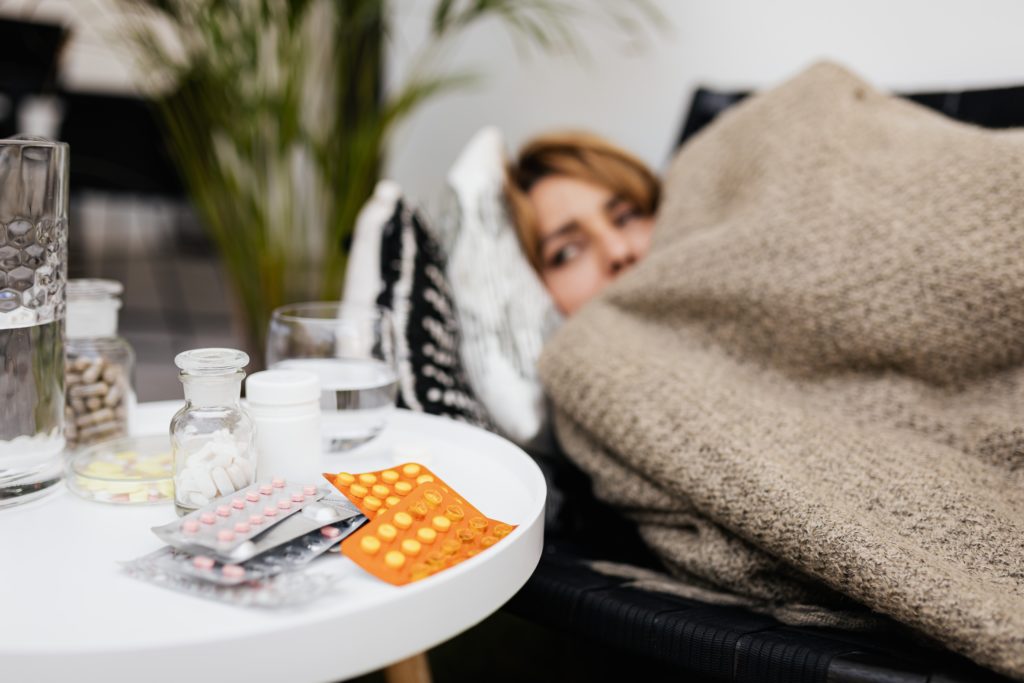
We hear a lot about one of the main offenders of vaginal dryness: reduced estrogen due to menopause (or other conditions).
But what about some of the other causes of vaginal dryness – those troublesome hidden offenders that we can’t identify immediately? You may be surprised to discover they’re lurking in plain sight – perhaps in the medications we take.
Here, we’ll discuss a few of the main medicinal offenders of vaginal dryness, and how you can identify and manage them.
Common Medicinal Products That May Be Causing Your Vaginal Dryness
Diuretics
Diuretics, or “water pills” – commonly used to treat high blood pressure – work to flush salt and excess fluid out of your body via your urine. A common side effect of this is dry mouth, dry eyes, and – you guessed it – a dry vagina.
Antihistamines
Another common offender of vaginal dryness is antihistamines.
Antihistamines – commonly used to relieve allergy symptoms – work by blocking the chemicals called histamines that are produced when you come in contact with whatever you’re allergic to – be it dust mites, pollen, ragweed, or other common allergens. Like diuretics, antihistamines also tend to create a drying-out effect. Great for your runny nose; not so great for your vaginal tissues.
Anticholinergics
Medications used to treat overactive bladders, sometimes called anticholinergics, can also cause dryness in the body, including the vagina.
Antidepressants
Those of us who take medication for depression may have experienced one of antidepressants’ common side effects – low libido or sexual dysfunction. And not being in the mood to engage in sexual activity goes hand-in-hand with the inability to become aroused. For women, this can show up as a lack of vaginal lubrication.
Why It’s Easy To Miss These Offenders
At this point, you may be thinking, “Wow, these medications are so common! Why are we not connecting them to vaginal dryness?” Great question!
Specialists Are Focused On Their Target Areas
When you have an issue in a part of your body, you see a specialist in that area – whether it’s a cardiologist, psychiatrist, or gynecologist. And that specialist is focused on finding a solution to the concern(s) in that area of your body.
Cardiologists, psychiatrists, and other non-reproductive healthcare providers search the “upstairs” part of your body (above the waist; non-reproductive) versus the “downstairs” (reproductive) part. In other words, they’re looking for different conditions and not focused on the areas typically targeted by OB-GYN practitioners.
Conversely, your OB-GYN is focused on your reproductive system functions, and may not inquire about the medications you may be taking that target other areas of your body.
Each specialist is looking for a resolution to the particular medical issue(s) in their area of specialization, and therefore the other areas may go unacknowledged.
Patients May Feel Uncomfortable (Or Not Understand What’s Causing Their Issues)
As patients, even if we suspect that one of our medications is causing problems down below, we may not feel comfortable addressing the issue with our male (or female) cardiologist or dermatologist. Or perhaps we don’t even know what’s causing the dryness to begin with.
How Can We Acknowledge & Manage These Vaginal Dryness Offenders?
Talk to your healthcare provider to discuss options
First and most importantly: Continue to follow the advice of your healthcare provider. Don’t stop taking medication because you suspect it may be causing unwanted side effects like vaginal dryness.
Instead, if you suspect that one of your medications is causing vaginal dryness, try mentioning it to your healthcare provider. If you feel uncomfortable, perhaps start by easing into the conversation by saying, “You know, I think this medication may be causing some additional side effects.” This may prompt your healthcare practitioner to begin considering side effects outside of the typical areas. Bring a list of all of your prescriptions and non-prescription products to your visit to discuss the potential for interactions and side effects. From there, they may encourage you to explore it further with your OB-GYN.
Consider Adding A Vaginal Moisturizer
Relief from the medicinal side effect of vaginal dryness could be as simple as adding a vaginal moisturizer – such as Mia Vita™ Personal Lubricant and Moisturizer – to your daily intimate skincare regimen.
___
Regardless of what may be causing your vaginal dryness, it’s important to be forthcoming about it. If your healthcare provider isn’t asking the right questions, bring up the topic on your own. Provide as much information as you can. Together, you can find a solution and start feeling better.
Note: For a deeper dive into this topic, check out the podcast episode.
Source: